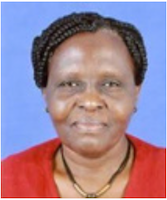Alumni of the Month

Penina Muhando MLAMA
YEAR OF MATRICULATION: 1968
EDUCATION:
Penina O. Mlama [nee Muhando] was born in the Berega village of Kilosa district in Morogoro on 3th March, 1948. She went to primary school at Berega in the same village, then to Mvumi middle school in Dodoma, thereafter proceeding to secondary education at Msalato Girls in Dodoma for junior secondary and then all way to Jangwani Girls for senior secondary education. Her father was a teacher and so his official relocations had an effect on her physical mobility to schools. She entered the University of Dar es Salaam in 1968 and pursued a three-year Bachelor of Arts degree in Theatre Arts, Language-and-Linguistics and Education. She was ‘retained’ by the University as a tutorial assistant in the-then Department of Theatre Arts, from which she grew within the ranks to become one of the best-reckoned playwrights Tanzania, East Africa and Africa have produced in academia and on the open theatre of the modern post-colonial period of national development. She obtained her Master of Arts in Theatre (University Dar es Salaam, 1973) and her Doctor of Philosophy in 1983). For those who were there in the formative years of the department of Theatre Arts at UCD, and recall the vitality of theatrical training under the able leadership of the founding head of department, Prof. Hebert L. Shore, they will not be surprised by the enduring spirit Penina came to embrace and live not only as a playwright and educator but also as a head of department she came to be in the decades that followed. It is a true story that Penina Muhando Mlama has treaded the same kind of line of dedicated and disciplined mentorship in exemplary performance that relives development aspirations and focuses on training of individual learners within the framework of ethical principles of the wider national community.
She grew through the university ranks to become a head of department of Theatre Arts (1982-1988), associate dean of the faculty of Arts and Social Sciences (1989-1990), dean of the faculty (1990-1991) and Chief Academic Officer [the equivalent to the current deputy vice- chancellor for academics] in 1991. She participated fully within the university management team which initiated the University’s maiden transformation programme and the associated corporate strategic plan from the rough beginnings in 1992/03 well into a self-sustaining system.
Dr. Mlama has been in the rank Professor since 1984 – teaching, training and mentoring students and younger staff alike in the nitty-gritty of a professional artiste, arguing that “the element of conscientisation in theatre demands much more than theatre skills on the art of the director. As she puts it, “... the leader of such an encounter should have more knowledge than the community in question so that he or she can provide relevant guidance”. It was her wider and creative experience that Prof. Mlama has been invited by so many and varied institutions, worldwide, to share her management experience, her practical skills and her cultural and pedagogical insights for the benefit of those institutions and for humanity in general. These institutions include FAWE [Forum for African Women Educators] based in Nairobi Kenya, CAMFED [Campaign for Education] in Dar es Salaam Tanzania, BASATA [Baraza la Sanaa la Taifa] in Tanzania and others. Upon return to Dar es Salaam from the FAWE regional office in Nairobi, Prof. Mlama has rendered equally vital services to the University and the wider community. Perhaps, the most vital role she has lately played was that of occupancy of the Mwalimu Julius Nyerere Professorial Chair in Pan-African Studies as the second incumbent from 2013 to 2018.
Professor Mlama has on record a number of plays, books, journal articles and works, including Haitia [Guilt], 1972; Heshima yangu, 1974; Pambo (Decoration), 1975; Fasihi na sanaa za maonyesho, 1976 ; Nguzo Mama [Mother, the main pillar], 1982; Lina Ubani [There is an antidote for rot], 1984; Mitumba Ndui [The Pox], 1989; Culture and Development: The Popular Theatre Approach in Africa (with Nancy J. Schmidt), The International Journal of African Historical Studies 25(3):681, • January 1992; African Perspectives on Programmes for North American Students in Africa: The Experience of the University of Dar es Salaam, 2000; African Issues, 28; Popular theatre and development challenges for the future: The Tanzanian experience, 2002 – journal article; Pressure from within: the Forum for African Women Educationalists (Book chapter), 2005; and many more.

